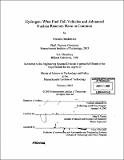Hydrogen : what fuel cell vehicles and advanced nuclear reactors have in common
Author(s)
Demirdöven, Nurettin, 1974-
DownloadFull printable version (5.257Mb)
Other Contributors
Massachusetts Institute of Technology. Technology and Policy Program.
Advisor
John M. Deutch.
Terms of use
Metadata
Show full item recordAbstract
This thesis reports on two technology and policy issues directly related to hydrogen economy. The first issue concentrates on the end-use application of hydrogen as a transportation fuel, and deals with the following question: what is the place of hydrogen fuel cell vehicles among the new, more-efficient advanced vehicle technologies. Our analysis indicates that fuel cell vehicles using hydrogen from fossils fuels offer no significant energy efficiency advantage over hybrid vehicles in urban driving cycle. Therefore, there is a strong justification for federal support for hybrid vehicles that will achieve similar results, quicker. The second issue focuses on another important technology and policy question related to large scale hydrogen production: are there any comparative efficiency, cost and/or political advantages of using an advanced nuclear reactor coupled to a thermochemical conversion plant to produce hydrogen with respect using a conventional nuclear reactor coupled to an electrolysis plant? The results suggest that given the existing technical and cost uncertainties, developing an advanced nuclear reactor technology solely for the use of thermochemical hydrogen production is not good energy (R&D) policy. Electrolysis is a more promising alternative provided a more efficient electrolysis technology can be coupled to an advanced nuclear energy (i.e. electricity) source at a reasonable cost. Therefore, large R&D investment in thermochemical hydrogen production should be balanced with a similar R&D in large scale electrolysis technologies that are relatively easier to deploy and have lower engineering risks.
Description
Thesis (S.M.)--Massachusetts Institute of Technology, Engineering Systems Division, Technology and Policy Program, 2005. Vita. Includes bibliographical references.
Date issued
2005Department
Massachusetts Institute of Technology. Engineering Systems Division; Technology and Policy ProgramPublisher
Massachusetts Institute of Technology
Keywords
Technology and Policy Program.